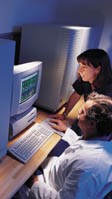 Critical
links "In the process, we have developed very specialized techniques in mass genetics testing and data acquisition and analysis," said Pedersen. "We have even developed our own software to analyze the samples faster and more accurately." "To do this work," said viral immunologist Marcia Eggleston, associate director of services at the lab, "we use automated sequencers, the same machines the whole human genome project is using. No one here sits and stares at gels to find the abnormalities or repeats in the DNA sequences. We have lasers that read the fluorescent dyes and software that then determines the sizes of the base pairs and can detect abnormalities. "That allows us to run 1,000 samples a day looking at 15 different markers per sample. That means we are determining 15,000 genotypes in a day. No one else does this work as accurately, efficiently or as cheaply as we do it." For researchers working on human cancers, such facilities are a godsend. "For both research and clinical purposes we need to be able to analyze tumors as quickly as possible to determine their types and stages and to be able to accurately predict their prognosis," said prostate cancer researcher Ralph deVere White, director of the UC Davis Cancer Center. "The Vet Genetics Lab at UC Davis can do this for us, so it only makes sense to pool our resources to take advantage of the vast array of talent in both animal and human medicine here." Photo right: Viral immunologist Marcia Eggleston oversees lab analyses of more than 1,000 DNA samples a day.
Home |
Table of Contents |
To our Readers |
Building on Basics UC Davis Health System | © 2000, 2001, 2002 UC Regents. All rights reserved. |
  |
